Afghanistan War, CIA Sponsored Terror, Civil Liberties, Criminalizing Dissent, Human Rights, NSA Spying, Political Prisoner, Prison Industry, Supreme Court, Surveillance, Torture, War Resister
Podcast: Play in new window | Download
Updates:
- NSA Collecting MetaData And Content On Five Countries
- Julian Assange-Glenn Greenwald Twitter Storm
- Host Discussion On NSA Ubiquitous Data Collecting
——-
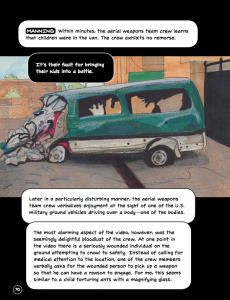

The United States vs. Private Chelsea Manning
Last year our own Michael Ratner made many trips to Fort Meade to attend the very secretive Private Chelsea Manning trials. Michael had also explained in past shows about how he heard Chelsea testify as to why he released each set of documents such as the Iraq war logs, the Afghanistan war logs, State Department cables and more. She said her decision to release the documents were done as an act of conscience. Our guest Wikileaks activist and artist Clark Stoeckley was also at this historic trial. His recent graphic novel titled The United States vs. Private Chelsea Manning is a collection of his vivid sketches from inside the court room. He joins us to talk about his work as an activist and his experiences producing the book. Welcome to Law and Disorder.
Clark Stoeckley:
- As I understand the transcripts are still under seal.
- Those sketches took a little bit longer, ones that where full court room where I drew a lot of people.
- I would work in pencil and draw as quickly as I could everything that I saw in the court room and then I would come back and fill it in with color and hard outlines.
- What she was doing was offering up 20 years of her life, accepting full responsibility and that takes a lot of courage and bravery to do that – being the smallest person in the court room and being noble about it.
- Unfortunately the media wasn’t there to catch the pre-trial. They only showed up on the first day and then the sentencing and the verdict.
- I remember how the court room fell to a complete silence when that video came on and the tears, and the blank stares on the prosecutions’ faces.
- I’m looking through the book right now, I see you, you’re in the picture there Michael Ratner, in the background sitting behind Chelsea.
- 35 years was the sentence and that’s going to be appealed. As I understand the appeal will start as early as December.
- They didn’t like that we’re holding vigils every week and holding large protests there. They shut down the road and they had to re-route traffic. It was the largest protest Ft. Meade had every seen.
- Just a heads up to anyone who wants to correspond with Chelsea, you know have to use the name Chelsea when addressing envelopes. http://www.chelseamanning.org/
- I just started putting them in libraries today.
- CHELSEA E. MANNING 89289 / 1300 NORTH WAREHOUSE ROAD / FORT LEAVENWORTH, KANSAS 66027-2304
Guest – Clark Stoeckley, is an artist and author of the book The United States v. Private Chelsea Manning. He’s also the owner of truck with the WikiLeaks logo emblazoned on it. Stoeckley’s vivid sketches from inside the court and beyond, together with carefully selected transcripts of the proceedings, trace the arguments as they move back and forth between the defense and the prosecution.
——-
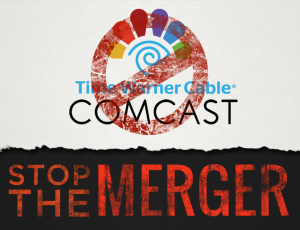

Net Neutrality – The Time Warner/Comcast Merger and New Rules Proposed By The FCC
In our last interview with attorney Matt Wood, policy director at Free Press, we talked about the 45 billion dollar Comcast -Time Warner merger and its implications to net neutrality. This proposed merger would unite the nation’s largest cable TV and internet service provider with the second largest cable company. If combined, these companies would offer service to two thirds of U.S. households. We get an update on the merger and we also discuss the new rules proposed by the FCC about net neutrality. Net neutrality essentially means preventing unreasonable discrimination against content on the internet. The Free Press maintains that the new FCC rules would kill rather than protect net neutrality and allow rampant discrimination online.
Attorney Matt Wood:
- What the court said was that you can’t treat broadband providers as common carriers – not as some insurmountable conclusion but simply based on the way the FCC has decided to treat them up to this point.
- So the FCC up to this point has tried to deregulate and yet tried to maintain some of the protections we all need from our communications.
- Though its in the FCC’s discretion according to the majority and according to the DC circuit, what the courts have said, the FCC has made this decision in the past. They still haven’t reversed it, they still want to say that broadband is not a common carrier service and therefore the FCC can’t adopt common carrier or common carrier like obligations for broadband.
- There’s obviously a grave concern to government secrecy and censorship especially when it comes to whistle-blowers and the kind of information that Edward Snowden brought to all of us.
- If you used the phone to commit a crime whether that is wire fraud or you’re talking to your co-conspirators about how to conduct the crime. It is not the telephone company’s place and either say you can or can’t make that call.
- Net neutrality is a way of insuring that the carrier of our speech (that’s typically a private company) doesn’t have a role or not in deciding whether that speech goes through.
- If and when the government steps in and says hey we want to tap that line because we’re actually conducting an investigation or if and when there’s a punishment for the activity that you used the phone to plan that’s obviously a very important legal debate.
- Net neutrality is not a way for the government to control our speech. It is a way to insure that our cable and phone companies do not control our speech.
- The FCC in its current mode is basically saying well even if we’re required to allow these two tiers or multiple tiers of service, we can still step in and protect you and provide a basic level of service.
- This isn’t just about big internet companies on one side and big telephone and cable companies on the other side, its about that we all use the internet especially in a cloud based system. We’re using it not just to watch movies which is an important cultural activity but to back up our files, to send educational videos.
- What the cable and telephone companies want to do is charge you extra to reach their customers and they want to charge in both directions.
- If you want to reach them at all Netflix or Google, Law and Disorder, you also have to pay us now.
- Its no secret that FCC Chairman Wheeler headed not just one but two telecommunication lobbies.
- The FCC has this proceeding that it will be running over the summer. What Chairman Wheeler has proposed we think is not good enough but its not a done deal either so the FCC will take comments not only from companies and groups like ours but members of the public.
Guest – Attorney Matt Wood helps shape the policy team’s efforts to protect the open Internet, prevent media concentration, promote affordable broadband deployment and prioritize a revitalized public media. Before joining Free Press, he worked at the public interest law firm Media Access Project and in the communications practice groups of two private law firms in Washington, D.C. Before that, he served as editor-in-chief for the Harvard Civil Rights-Civil Liberties Law Review, worked for PBS, and spent time at several professional and college radio and television stations. Matt earned his B.A. in film studies from Columbia University and his J.D. from Harvard Law School.
—————————————————————————

Please help support Law and Disorder, the show is now a sponsored project of Fractured Atlas, a non-profit arts service organization. Contributions for the charitable purposes of Law and Disorder must be made payable to Fractured Atlas only and are tax-deductible to the extent permitted by law.
CIA Sponsored Terror, Civil Liberties, Criminalizing Dissent, Habeas Corpus, Hydraulic Fracturing, Prison Industry, Surveillance, Targeting Muslims, Torture, Truth to Power
Podcast: Play in new window | Download
Updates:
- John Kerry Middle East Peace Talks And NY Times Propaganda
- There is no ‘Palestine Exception’ to free speech rights’: Northeastern overturns Students for Justice in Palestine suspension
- CCR: Palestine Solidarity Legal Support Project
- Host Attorney Micheal Smith Retraction On Abe Foxman Update
——
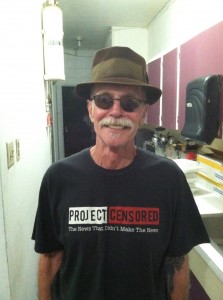

Torturous For-Profit Medical Care in Prisons
The medical care in private prisons is often provided by a sub contracted for profit entity. Today we look at a specific case involving Corizon, a prison health management corporation serving 530 prisons in 28 states. Corizon has been sued for malpractice 660 times in the past five years. We talk today about “Bradley’s” case. He’s 67, and was out on parole after serving 34 years in California’s state prisons. Bradley was on 100mg of morphine 3 times a day for surgical complications from knee injury. While on parole, THC was detected in his system, and officers brought him back to prison. However, under the care of Corizon, he was not given his medication and forced to painfully withdraw from the morphine.
Dr. Robin Andersen:
- My brother who we call Brad is at Santa Rita jail who Corizon is under contract with.
- He went in on April 17, and after a week of being in there, my lawyer and my sister said he was on death’s door.
- The reason was he was being forced to withdraw from medications. His medications are morphine and high blood pressure medication.
- He was given no medications for pain, and he basically did cold turkey inside that jail and is still being mistreated there.
- This is a parole violation where its alleged he might have smoked some pot.
- He was in San Quentin and some other California prisons. He served 34 years. When he was finally paroled one of the parole board members said – well we assess that the crime that you did to be about 11 years.
- Just the thought of him in that jail without medication for that time, it was agony.
- What the jail has told me is they don’t give out controlled substances.
- What my lawyer said is their policy to save money, they don’t have proper medication.
- They’re putting him through a forced cold turkey withdrawal and laughing at him.
- They keep using the word protocol, and it rings in my ear. Oh, he’s on a withdrawal protocol. One wonders what that protocol might be.
- I’ve been asking people to call the jail. It’s very interesting, they thrive in secrecy and brutality within these places.
- Call the Santa Rita County Jail – 925-551-6500. Lawrence (Bradley) Benetto – Prisoner # BKB172
Guest – Dr. Robin Andersen, is the brother of “Bradley” and Professor of Communication and Media Studies and Director of the M.A. Program in Public Communication. She is also Director of the Peace and Justice Studies Program at Fordham University.
——–
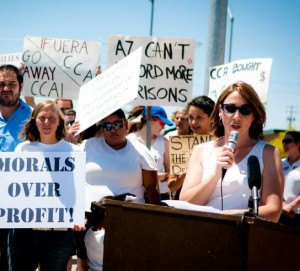
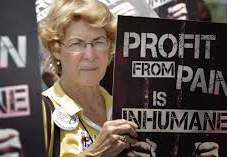
Lawsuits Against Prison Health Management Corporations
Class action lawsuits against prison health management corporations are becoming very common. There are many cases and stories of mistreatment and negligence which critics say stem from profit making and cost cutting protocols. We take a deeper look at the recent litigation involving lawsuits against private, for profit prison health care companies.
Attorney Sarah Grady:
- Corizon, they’re a multi-billion dollar company. They’ve operated under many names throughout the years.
- They’re whole model is to provide as little health care as possible in order to continue to drive a profit. They take into account in their profit, how often they’re going to be sued.
- They gamble in effect on how much money they’re going to lose in lawsuits and whether that can keep them profitable by continuing to deny care to prisoners.
- When Corizon contracted with Arizona to provide care (in prisons) in the first 8 months there were 50 deaths in Arizona Department of Corrections in their custody, that’s in a single state.
- There are multiple stories of substandard care being provided by nurses and doctors who have not been trained, who have been trained at a suboptimal level.
- The states, county or municipality cannot contract away the 8th Amendment.
- The individual doctors get bonuses based on their ability to stay under budget.
Guest – Attorney Sarah Grady leads Loevy & Loevy’s Prisoners’ Rights Project. Ms. Grady graduated cum laude from Northwestern University School of Law in 2012. At Northwestern, she worked on civil rights cases with the Roderick and Solange MacArthur Justice Center in the Bluhm Legal Clinic.
Sarah Grady joined Loevy & Loevy in 2013. She leads Loevy & Loevy’s Prisoners’ Rights Project.
Ms. Grady graduated cum laude from Northwestern University School of Law in 2012. At Northwestern, she worked on civil rights cases with the Roderick and Solange MacArthur Justice Center in the Bluhm Legal Clinic, served on the board of the Public Interest Law Group and the American Constitution Society, and received Northwestern’s annual Public Service Award for her commitment to serving the public interest in her legal work.
– See more at: http://www.loevy.com/attorneys/sarah-grady/#sthash.M7ruq9uH.dpuf
Sarah Grady joined Loevy & Loevy in 2013. She leads Loevy & Loevy’s Prisoners’ Rights Project.
Ms. Grady graduated cum laude from Northwestern University School of Law in 2012. At Northwestern, she worked on civil rights cases with the Roderick and Solange MacArthur Justice Center in the Bluhm Legal Clinic, served on the board of the Public Interest Law Group and the American Constitution Society, and received Northwestern’s annual Public Service Award for her commitment to serving the public interest in her legal work.
– See more at: http://www.loevy.com/attorneys/sarah-grady/#sthash.M7ruq9uH.dpuf
Sarah Grady joined Loevy & Loevy in 2013. She leads Loevy & Loevy’s Prisoners’ Rights Project.
Ms. Grady graduated cum laude from Northwestern University School of Law in 2012. At Northwestern, she worked on civil rights cases with the Roderick and Solange MacArthur Justice Center in the Bluhm Legal Clinic, served on the board of the Public Interest Law Group and the American Constitution Society, and received Northwestern’s annual Public Service Award for her commitment to serving the public interest in her legal work.
– See more at: http://www.loevy.com/attorneys/sarah-grady/#sthash.M7ruq9uH.dpuf
Sarah Grady joined Loevy & Loevy in 2013. She leads Loevy & Loevy’s Prisoners’ Rights Project.
Ms. Grady graduated cum laude from Northwestern University School of Law in 2012. At Northwestern, she worked on civil rights cases with the Roderick and Solange MacArthur Justice Center in the Bluhm Legal Clinic, served on the board of the Public Interest Law Group and the American Constitution Society, and received Northwestern’s annual Public Service Award for her commitment to serving the public interest in her legal work.
– See more at: http://www.loevy.com/attorneys/sarah-grady/#sthash.M7ruq9uH.dpuf
——–
Attorney Anand Swaminathan:
- We a broad spectrum of issues both in terms of types of facilities where these things are occurring and the actual kinds of medical problems that are not being dealt with or ignored.
- There are states, counties and municipalities all engaged in this form of privatization which are outsourcing medical care to these private companies.
- It includes, large prisons people who are convicted of crimes, it includes people who are being held in custody, that includes county jails which are a hybrid facility that holding people long term and people in short term custody.
- It’s everything down to the local police station.
- We’re seeing a lack of adequate medical care across that entire spectrum.
- There’s a complete failure to treat chronic conditions, some of the chronic conditions that are so prevalent in our society now.
- These people (prisoners) are not consumers and cannot choose and say I find your product subpar, I’m not interested, I’m going to choose the other guys’ product.
- We’re starting to see a push back. Courts are starting to attack specific protections that companies are invoking.
- Here you have courts identifying market forces as a reason to deny the protections that some of these companies are trying to invoke.
Guest – Attorney Anand Swaminathan, has worked on a broad range of constitutional and civil rights cases, and has worked extensively on False Claims Act litigation, where he has represented whistleblowers alleging defense military and other government contractor fraud, bid-rigging, Medicare and Medicaid fraud, construction/contractor (MBE/DBE) fraud, and tax fraud.
———
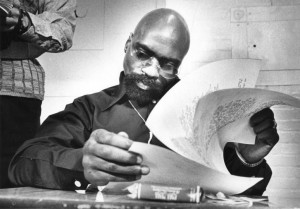
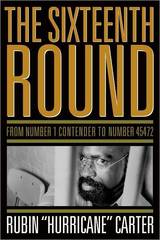
Rubin “Hurricane” Carter 1937-2014
In April of this year, celebrated boxer and prisoner-rights activist Rubin “Hurricane” Carter died at the age of 76. He had become an international symbol of racial injustice after his wrongful murder conviction forced him to spend 19 years in prison. Carter was arrested for a triple murder in his hometown of Paterson, New Jersey. He said he was innocent, was convicted by an all white jury, and sentenced to three consecutive life sentences. In 1976, the New Jersey State Supreme Court overturned his conviction on grounds the authorities withheld material evidence from the defense. But Carter was convicted again in a second trial in 1976. In 1985, that conviction was overturned by a U.S. district court judge, who concluded the state made an unconstitutional appeal to racial prejudice. In 1988, the Passaic, New Jersey, Prosecutor’s Office dropped all charges against Carter.
Attorney Myron Beldock:
- He was a defendant in a criminal case in New Jersey involved the triple shooting and three murders of 3 people in the Lafayette bar in Patterson, New Jersey.
- He and his co-defendant John Artis were represented at the first trial and they lost, (convicted) and Rubin started his campaign to get out of jail and wrote his book the 16th Round.
- He was charismatic and powerful, a great thinker, very very intellectually strong person as well as being spiritually strong.
- Almost a typical case, high profile case, where you get people who are vulnerable and easily manipulated because of their need for their own benefits to falsely testify.
- We set aside the convictions when we learned about the benefits that were given to the witnesses.
- We went again to trial in 1975. At that time the atmosphere had changed. There was a new prosecutor, they came up with a theory that it was actually a racial revenge killing.
- Earlier that night, a white former bar owner had shot and killed the black purchaser of the bar from him.
- That was always known and there was no motives attributed to the killings in the first trial but the second trial really based on speculation and bias, they argued persuasively to the jury that this was a racial revenge killing.
- Mr. Bellow who was the supposed eye witness who testified, there were two of them in the first trial, was being questioned by me on the stand as to why he recanted his recantation. The prosecutor persuaded him to again tell the story he told at the first trial, identifying Rubin and John and I was trying to establish that they had falsely manipulated him when I was pulled into the chambers along with my co-counsel Louis Steele who represented John Artis and told that if I question him further, the jury would learn that he passed the lie detector test, supporting what he said at the first trial. Supporting his identification (of Rubin Carter)
- We did have that test. It seemed like that was the result because that’s the way it was written. In fact that was a fraud.
- The polygraph results were completely opposite of what they were purported to be.
- The prosecutors in that case, two of them became judges, rewarded for what they did.
- Rubin was not a popular person, he had been an outspoken civil rights person. It was a cesspool of rumors without any evidentiary basis.
- The entire community there almost in Passaic New Jersey treated us like we were the devil.
- It was the coldest community reception I ever encountered in any place.
- Rubin would call every year (from Canada) on the anniversary of his release. He got a group of Canadian do-gooders and free thinkers to join him in fighting to set aside convictions for people who were wrongly convicted in Canada.
- He would vet the briefs that we sent. He was a very unusual client.
- Rubin refused to act as a prisoner because he wasn’t anyone who was guilty he said.
- So, he didn’t eat prison food, he didn’t take prisoner assignments, he didn’t wear prison clothes and somehow or other he was able to pull that off.
- People think of it as being another time, I’ve been practicing law long enough and I don’t think anything changes.
- The same kind of bias runs deep throughout the community its just masked somewhat differently.
- You make your luck in these cases, you have to forge ahead.
- His insistence on being an innocent person and will not compromise with the system is the kind of inspiration that pushes us on as lawyers.
Guest – Attorney Myron Beldock, graduated from Erasmus Hall High School in 1946, Hamilton College in 1950 and Harvard Law School in 1958. He served in the U.S. Army from 1951 to 1954 and as an Assistant U.S. Attorney in the Eastern District of New York from 1958 to 1960. After several years as an associate with a small New York City firm and as a single practitioner, he brought together two friends and former Assistant U.S. Attorneys, Elliot Hoffman and Larry Levine, to form Beldock Levine & Hoffman in 1964. He is best described, by his own definition, as an old-time general practitioner. He concentrates on trial and appellate litigation, in state and federal courts, in defense of criminal charges and in pursuing plaintiffs’ civil rights actions based on police and prosecutorial misconduct and employer and governmental discrimination. He regularly consults and defends charges of professional discipline. He represents plaintiffs and defendants in a wide variety of personal and business related matters, working with others in the firm’s various practice areas.
——————————————————————————-

Please help support Law and Disorder, the show is now a sponsored project of Fractured Atlas, a non-profit arts service organization. Contributions for the charitable purposes of Law and Disorder must be made payable to Fractured Atlas only and are tax-deductible to the extent permitted by law.
CIA Sponsored Terror, Civil Liberties, Criminalizing Dissent, Extraordinary Rendition, Guantanamo, Human Rights, Political Prisoner, Prison Industry, Surveillance, Torture, Truth to Power, War Resister
Podcast: Play in new window | Download
Updates:
——
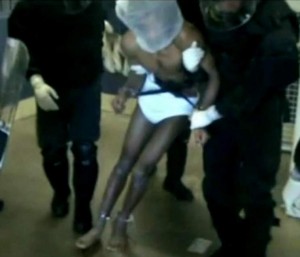
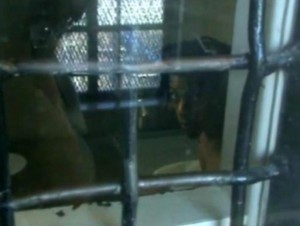
The Dallas 6: Abuse In Solitary Confinement
In April of 2010, a group of inmates locked in solitary confinement at SCI Dallas prison in Pennsylvania were suffering so much abuse and brutal treatment by prison guards they had placed their bedding over the window of their cell doors to attract attention of the prison administrators. Instead of receiving assistance, the inmates were brought up on riot charges. Last December the inmates known as the Dallas 6 defended themselves and presented testimony describing the details of their abuse in solitary confinement.
Shandre Delaney:
- This case, the Dallas 6, began in April 2010. These men were all in the RHU at SCI Dallas, in Dallas PA.
- The RHU is the restrictive housing unit, its an acronym for solitary confinement.
- All of these men had been victims of abuse and torture during their stay in solitary confinement.
- The Dallas 6 are Andre Jacobs, Anthony Kelly, Anthony Locke, Dwayne Peters, Derek Stanley and my son Carrington Keys.
- Most of these guys went into solitary for minor infractions, maybe to stay 60-90 days. My son stayed in there for 10 years, and I think all of the other guys about the same.
- These guys were jailhouse lawyers. These guys were people who spoke up and sent word to the outside about what was going on in solitary confinement.
- Once you do that – they call it misconduct, which are write ups, they’ll give you false write ups, and all types of things just to keep you in there longer.
- The cells are 6X9. In solitary, they might have a window to the outside. There is a bunk that they sleep on. There is only a slot for food to come in and out.
- You’re supposed to come out of your cell for one hour a day. They may get a shower 2 or 3 times a week.
- They lied to me for years and told me he wasn’t allowed visits. I later found out that they’re allowed one visit per month.
- The group that I work for Human Rights Coalition, some of the information that was sent from SCI Dallas, a 93 page report was written called Resistance and Retaliation.
- They sent a copy back in (to SCI Dallas) they didn’t mark out the guys’ names, so once the guards got a hold of this, and saw the guy’s names, they started one by one beating guys.
- They took one guy and put him in a restraint chair. You’re only supposed to be in the restraint chair for 2 hours, they kept there over night.
- They (the guards) told the guys (Dallas 6) we’re comin for you. In order to bring attention from a lieutenant or a superior officer, you have to cover your cell window.
- They covered their cell windows. The guards put on riot gear and one by one they beat these guys very bad.
- It’s all on video tape. They tasered a lot of the guys on their genitals.
- They have you like a hog or something, I saw it on the video.
- They cut their clothes off and left them for hours in cages.
- May 5, 2014 is supposed to be the official trial date. The official trial date has been going on for 2 years.
- I was praying every night hoping the phone didn’t ring and they tell me they killed him.
- They took out to shower and threw him down the steps and broke his nose, they busted his teeth out with a stick before.
- They put glass in his food.
- HRCoalition.org
- Dallas 6 Blog
- Petition to Indict Luzerne County Officials
- Summary in Support of Petition to Indict
Guest – Shandre Delaney, a powerful activist with HRCoalition and the mother of Carrington Keys, one of the Dallas 6.
—–
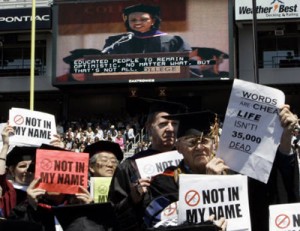

Rutgers University Plans to Give Condoleezza Rice Honorary Degree
Students and faculty at Rutgers University have rejected the idea to invite former Secretary of State Condoleezza Rice to speak at this year’s commencement ceremony and receive an honorary degree. The Board of Governors in February of this year unanimously voted to award Rice the invite for a fee of 35 thousand dollars. They also voted to give the national security adviser under former President George W. Bush an honorary degree. Resolutions signed by the university faculty and staff calls for Rice to be disinvited.
Professor Deepa Kumar:
- Historically our process at Rutgers University has involved having 20 some faculties, students, involved in the process of selecting the commencement speaker, typically by canvasing students and canvasing faculty and then making a recommendation to the president as to who to invite.
- When president Barchi came to your university in 2012 he completely violated this open and democratic process, formed a committee of 6 people including himself. Then they decided to go ahead an invite Condoleezza Rice.
- We believe that this was actually politically motivated. What suspect is that Chris Cristi who was riding high at that time in 2012, before bridge-gate, very likely wanted to have Condoleezza Rice as Vice Presidential candidate when he runs.
- So far we have taken out a petition drive, the students have their own petition drive, hundreds of people have signed up. We’ve also talked about holding a protest outside should our efforts fail.
- The last time Dr. Rice was invited to be a commencement speaker was at 2006 at Boston College, when everybody turned their back to her when she started to speak.
- Condoleezza Rice was very much a part of the systematic lying to the American public and quite frankly we at Rutgers teach our students to ethical to be responsible citizens.
- At Rutgers we have a 44 percent minority student enrollment. It’s a very diverse school and I welcome African American women as commencement speakers but I think there are better people like Anita Hill or Angela Davis.
- In 2002 we know from a Senate Committee Intelligence Report of 2009 that when Rice was chair of the National Security Council she gave a verbal approval to then CIA director George Tenet to go ahead and use enhanced interrogation techniques.
- She’s been quite steadfast in defending the use of torture. She gave a speech at Stanford University where she argued that if torture is authorized by the president then it doesn’t violate the Geneva Convention against torture.
- Commencement at Rutgers – May 18, 2014.
- Senator Feinstein called the use of torture a dark chapter in the history of this country.
- Clearly torture is a violation of international law and the Geneva Convention and I think to confer a Doctor of Law degree to someone who has been intimately connected with this “dark chapter” in our history I think is a serious embarrassment for Rutgers University.
- I’m really proud to be among the hundreds of faculty members and students who are actually standing up against this to disinvite her.
- Dick Cheney comes out and defends the torture program even now.
- If I Was Allowed To Speak
Guest – Deepa Kumar, an Associate Professor of Media and Middle Eastern Studies at Rutgers University. Her latest book is Islamophobia and The Politics of Empire by Haymarket Books and is in response to the events of 9/11, the Bush administration launched a “war on terror,” ushering in an era of anti-Muslim racism, or Islamophobia. Her first book, Outside the Box: Corporate Media, Globalization and the UPS Strike (University of Illinois Press, 2007), is about the power of collective struggle in effectively challenging the priorities of neoliberalism.
———————————————————————–
Help Support Law and Disorder Right Here

Law and Disorder is now a sponsored project of Fractured Atlas, a non-profit arts service organization. Contributions for the charitable purposes of Law and Disorder must be made payable to Fractured Atlas only and are tax-deductible to the extent permitted by law.
CIA Sponsored Terror, Civil Liberties, Criminalizing Dissent, Human Rights, Prison Industry, Surveillance, Torture
Podcast: Play in new window | Download
Updates:
- Immokalee Workers Demonstrations In Florida
- Michael Ratner: Ukraine Crisis Analysis Update
- Hosts Discuss CCR NYC Firefighter Racial Discrimination Case
- Law and Disorder Contest – The NSA Collected All Outgoing and Incoming Phone Calls Of What Country? (Use Site Contact Form)
- Brooklyn Folk Festival April 18 2014
- Hosts Remember Melba Hernandez, Heroine of Cuban Revolution
——-


FBI Meeting With TransCanada Industry Partners On the Keystone XL Pipeline
Here on Law and Disorder we’ve reported in depth on the targeting of environmental activists by federal agents that categorizing their exercise of free speech as terrorism. In a recent FOIA request obtained by the Earth Island Journal, the FBI held a daylong strategy meeting with TransCanada Corporation, the company building the 2100 mile Keystone XL pipeline in April of 2012. In March of 2012 President Obama made a speech in Cushing Oklahoma confirming the approval of the southern portion of the pipeline toward the Gulf of Mexico. The FBI meeting suggests that the highest levels of law enforcement are involved to monitor opposition to the pipeline.
Adam Federman:
- I spoke with a former FBI agent Mike German who is now at the Brennan Center and he was very surprised to see the juxtaposition of the FBI and TransCanada at the top of that letterhead which makes them look like partners.
- I also uncovered correspondence between TransCanada corporate security adviser and an FBI agent in South Dakota who he had invited to this meeting in Nebraska. They seem to be on very good terms.
- Clearly the company is using all levers of power to get this thing, not only approved but push opposition out of the way and potentially criminalize dissent.
- Tar sands oil which is primarily being mined up in Alberta is considered the dirtiest form of oil on the planet.
- The timing is quite interesting. Obama was in Cushing, at the TransCanada pipeyard at speech he gave that was not open to the public. That was on March 22, 2012 and he essentially approved the southern portion of the pipeline.
- About a week before that the FBI had met with TransCanada to start planning this strategy meeting.
- I’m in the middle of requesting additional documents looking more closely at both the Homeland Security and the FBI’s collaboration with the oil and gas industry beyond TransCanada.
Guest – Adam Federman, a contributing editor to Earth Island Journal. His writing has appeared in the Nation magazine, Salon, Columbia Journalism Review, Utne Reader, Gastronomica, CounterPunch, Adirondack Life, Adirondack Explorer and other publications. He is the recipient of a Polk Grant for Investigative Reporting, a Middlebury Fellowship in Environmental Journalism, and a Russia Fulbright Fellowship.
——
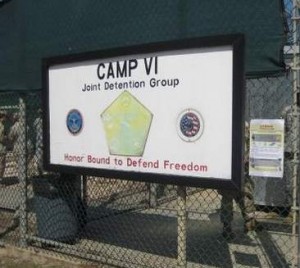
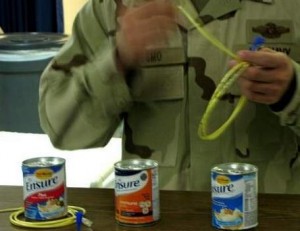
CIA Caught Spying On The Congressional Committee That Oversees It
We continue to discuss the bitter dispute between the CIA and the U.S. Senate committee that oversees it. Last week, the contention erupted when the committee chairwoman accused the CIA of spying on Congress. Senator Dianne Feinstein announced publicly the CIA had searched computers used by committee staffers examining CIA documents when they research the agency’s counter-terrorism operations and harsh interrogation methods or torture. She charged that the search violated the Fourth Amendment of the U.S. Constitution, the Computer Fraud and Abuse Act and an executive order that prohibits the CIA from conduction domestic searches. CIA Director John Brennan denied any charge of computer hacking.
Attorney Scott Horton:
- I say we go back to December 2012 when the Senate Select Committee finished work on a massive 6000 page review of torture practices including the operation of black sites by the CIA.
- This is something was researched over a period of several years. This was sent for CIA review and comment, and a war broke out almost immediately between the CIA and the Senate Select Committee.
- The CIA was making it clear that there were factual inaccuracies.
- The Senate Select Committee said – Now wait a minute, the CIA’s own notes about this show that their claims are not correct. That exchange is what triggered the latest war.
- In this case we come down to a set of particulars about how information was transmitted from the CIA to the Senate Select Committee.
- The CIA would not simply turn over documents to the Senate to be used in Senate offices and reviewed.
- What’s now become clear is that certain materials were turned over the Senate Select Committee and the CIA realized after the fact it wasn’t such a good idea, because it showed that the CIA was lying about aspects of its program.
- So they went in and deleted the files that they already turned over to the committee. I’d say that’s right at the crux.
- The CIA’s General Counsel, a fellow named Robert Eatinger then filed a criminal reference with the U.S. Department of Justice saying there had been a violation of security protocols by the Senate and the Senate staffers and demanding that the FBI and the Department of Justice investigate the Senate and the conduct of the Senate’s investigation.
- Then I think Dianne Feinstein went to the well of the Senate and delivered a remarkable speech – in which she talked about this in crisis of the Republic terms.
- It was really a dramatic speech, a very rare speech.
- This is the sort of thing that will get printed up and reproduced in text books.
- They really had to do something awfully bad to get her riled up this way and they did.
- There is no such thing is security classifications that block a Senate inquiry or block access of Senate staff who have security clearance.
- We know there that the lawyer at the Counter-terrorism center who was providing information to the Department of Justice to solicit those memos consistently made false or incorrect statements to the DOJ to get the memos, and that would be Robert Eatinger.
- Congress should have its own oversight of its own operations. It’s not up to the Executive to provide oversight.
- You cannot have the executive providing oversight of Congress’ oversight of the executive. It’s theoretically impossible.
- The National Security Division was established to be a law firm for the CIA.
- So they work for the CIA and the National Security Division has in the past been aggressively involved in cover ups for the benefit of the CIA.
Guest – Scott Horton, human rights lawyer and contributing editor to Harper’s Magazine. Scott’s column – No Comment. He graduated Texas Law School in Austin with a JD and was a partner in a large New York law firm, Patterson Belknap Webb & Tyler.
——————————————————————–
CIA Sponsored Terror, Civil Liberties, Human Rights, Political Prisoner, Prison Industry, Surveillance, Torture, Truth to Power, War Resister
Podcast: Play in new window | Download
Updates:
- Hosts Discuss The CIA Spies On Senate Committee Staff Computers
- Heidi Boghosian: Goes Back To 2009 When The CIA Destroyed Videotapes of Interrogation.
- Michael Ratner: When It Was Disclosed That The NSA Is Surveilling All Of Us, She (Feinstein) Stood In Front Of Everybody And Said Oh, This Is Great.
——
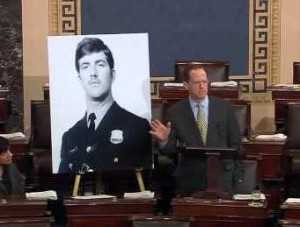
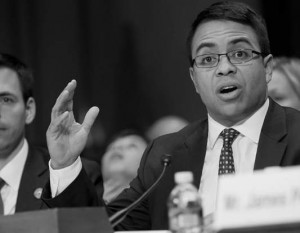
Senate Democrats Help Block Key DOJ Civil Rights Division Nominee
We take a looking at how a group of Senate Democrats broke ranks with President Obama to block key nominee Debo Adegbile as head of the Department of Justice’s Civil Rights Division. Seven democrats joined with Republicans to defeat Adegbile’s bid. That defeat was driven by the Philadelphia Fraternal Order of Police who launched a campaign against Adegbile and his work defending imprisoned Black Panther Mumia Abu-Jamal. Specifically, Adegbile was part of a team of lawyers at the NAACP Legal Defense Fund who successfully argued the trial judge’s jury instructions violated Abu-Jamal’s rights.
Professor Mark Taylor:
- The recent campaign has been foregrounded especially on FOX television news where you heard leading anchors and reporters connecting Dego Adegbile to Mumia Abu-Jamal.
- The Fraternal Order of Police wrote letters to media outlets. They wrote a letter to President Obama objecting to Dego Adegbile. This is fully congruent to what we in Educators for Mumia Abu-Jamal have experienced from the Fraternal Order of Police throughout the years.
- The Fraternal Order of Police will even stoop to maintaining a black list online of any of us Educators around the country not only for working for Mumia but for just for signing ads in the New York Times on behalf of Mumia Abu-Jamal’s new trial or release with restitution, whatever the case, they’ll maintain those charges.
- The Fraternal Order of Police will put pressure on venues that host the events for Mumia Abu-Jamal.
- It is a national organization and in their letter to President Obama they claim to represent some 350 thousand police officers across the country and claim to be speaking for those 350 thousand.
- There are elements of the Fraternal Order of Police all over the country who will step forward to ratchet up this venom against Mumia Abu-Jamal.
- They have always used Maureen Falkner the widow to be in the position of the grieving widow of the slain police officer in spite of the fact that there is exculpatory evidence. They don’t want to discuss that, they want to play the drama of the grieving relative instead.
- Of course that has powerful media appeal it often in our infotainment industry overrides argument, we know.
- There is a stigmatization that is pervasive throughout much of our culture that causes lawyers, public relations officers and others to back away from the issue.
- It’s an outrageous departure and betrayal of a tradition of civil rights advocacy that at least Democratic Party affiliates like to say they have supported through the years.
- We will hope that voters will make them pay a price for this kind of vote.
- We have voting rights issues because Dego Adegbile would have the job of which states to sue for Voter ID laws that are oppressive to African Americans.
- Educators for Mumia Abu Jamal
- Temple News At Temple University Ad Story.
Guest – Professor Mark Taylor, founder of Educators for Mumia Abu Jamal, a group of teachers from all levels of education, organizing since 1995 for a new a trial. Mark Taylor is a professor of Theology and Culture at Princeton Theological Seminary.
———
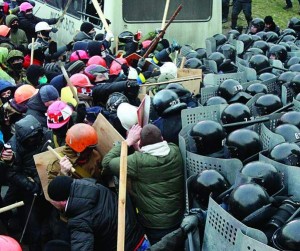

Ukraine and the Pathology of America’s Liberal Worldview. An African American Perspective
In his recent article, Ukraine and the Pathology of America’s Liberal Worldview. An African American Perspective returning guest Ajamu Baracka calls it a massive cognitive deficiency that President Obama asks Congress to agree on a billion dollar package aid for the Ukraine. Meanwhile, the elite opinion in the United States has embraced the position that cuts in public expenditures and services at every level of government are a reasonable and unavoidable necessity. Baracka says the crisis is here in the United States, with extended unemployment benefits for the 1.3 million people who lost thier jobs in Detroit.
Ajamu Baracka:
- It’s clear that there was legitimate social opposition in the Ukraine to some of the policies of the government there and there was an attempt to express some of those concerns that were quickly taken advantage of by some elements of the Ukrainian society that are, have been associated with some of the more fascist elements that have been aligned with the far right for decades.
- Some of those right wing forces ended up being the primary shock troops engaged in all kinds of violent activities.
- A decision was made in which the protesters had won much of their demands in terms of political reforms, but that agreement was jettisoned by those right wing forces.
- The result was that basically they stormed the institutions of the government and proclaimed themselves the new government.
- There’s real danger in characterizing this as a popular revolution. It’s clear that more than half of the population of Ukraine was still not convinced that a revolutionary movement was called for and one in which violated the tenants of the Ukrainian constitution.
- It became clear that the character of this revolution was one that was not really committed to social change.
- Here we have a situation in Detroit a city that is basically bankrupt as a consequence of these predatory banks and the disintegration of the U.S. economy and its urban cores.
- When the city officials went to the administration looking for assistance of course the line was, there’s no assistance for you.
- It’s not just Detroit it’s across the country. We saw in December Congress, when striking their budget deals they eliminated extensions for the long term unemployed.
- When it comes to the American people, the working class, the poor, there’s no money, there’s only growing austerity, but when it comes to advancing what many of us call the “empire” they can always find resources.
- The one billion dollar package to the Ukraine is a stark contrast to the line – There’s no resources to bail out the people of Detroit.
- Ultimately the winners in the Ukraine chess game will be U.S. capital and there would be some European capital that would benefit also.
- Ukrainian economy will be forced to open up. The financial sector will be exposed. Banks will be taken over. Whatever state industries that are viable will be seized, privatized. There will be massive unemployment.
- The Ukrainian workers will find that their wages not only increase but probably will be further eroded because they’re in competition with other poor workers throughout western Europe.
- That’s why the U.S. is salivating at the prospects of penetrating the Ukrainian economy.
- For reasons that are not really clear to me, many folks in the west in the U.S. don’t seem to be able to recognize this growing threat. This tendency to align themselves with the most reactionary elements on the planet.
- The way I see it is a global strategy on the part of U.S. and western imperialism and the alignment they’ve made with what everybody knows to be fascist elements within the Ukraine.
- It’s similar to alignments being made in slightly different ways to the radical right in Venezuela, with the continued support to the right wing government in Israel. .
- What we see is a counter-revolutionary strategy based on closer alignments with right wing forces throughout the world.
- There’s been mass confusion, people not being able to differentiate from the left and right, all they see is opposition and the opposition is enough for them to align with it.
Guest – Ajamu Baraka, Longtime activist, veteran of Black Liberation Movement, Human Rights defender, Former founding director of US Human Rights Network, currently Public Intervenon for Human Rights with Green Shadow Cabinet, member of Coordinating Committee of Black Left Unity Network and Associate Fellow at IPS.
———————————————————————–
Civil Liberties, Criminalizing Dissent, Death Penalty, FBI Intrusion, Habeas Corpus, Human Rights, Political Prisoner, Prison Industry, Targeting Muslims, Torture
Podcast: Play in new window | Download
Updates:
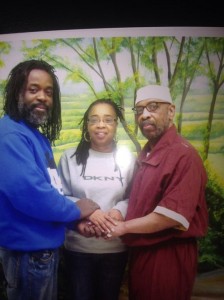
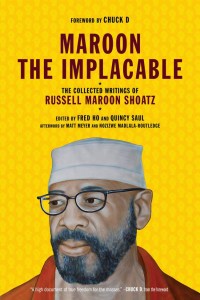
Russell “Maroon” Shoatz Released Into General Population After 22 Years of Solitary
Here on Law and Disorder we’ve been keeping you updated on the campaign to release Russell “Maroon” Shoatz from solitary confinement. We’re heartened to broadcast the news that he has been released from solitary confinement and is now in the general prison population. Maroon has spent 40 years in the U.S. prison system and 22 of those years were spent under intense lock down. He was allowed only one hour a day outside of that cell. In May of 2013 Maroon brought a lawsuit on the grounds that he was subjected to cruel and unusual punishment in violation of the Eighth Amendment of to the U.S. Constitution and that he was denied his legal rights to proceed with a case.
Attorney Bret Grote:
- We had a legal phone scheduled to take place Thursday February 20, when we received notice from the prison that the housing unit that he was in. The restricted housing unit was not going to be able to facilitate that phone call because he was not longer on the unit.
- I received a call from him at 1PM confirming that he had been released from solitary confinement just hours before that very morning. We notified his family. That same night he had his first contact visit in more than 20 years when his son Russell III, and his daughter Sharon were able to go see him. There’s a real wonderful picture of the 3 of them circulating on the internet.
- A constellation of forces and various tactics and strategies that had been deployed over a course of 3 years of renewed, reinvigorated effort to get Maroon out of solitary confinement.
- It started back in August of 2010 when State Representative Ron Waters held a hearing on solitary confinement in front of the House Judiciary Committee and Maroon’s daughter Theresa Shoatz was there and seeing former survivors of solitary confinement and advocates testify in the presence of DOC officials and state legislators inspired her.
- She said on that very day. I remember it crystal clear. “I’m going to get my Dad out of solitary.”
- That began a series of advocacy efforts including phone calls, including action alerts that saw the construction of a coalition of more than 30 organizations including the National Lawyers Guild, the Center for Constitutional Rights, the Human Rights coalition in Pennsylvania.
- There was no change in condition or indication that anything was going to change until late March of 2013. What had been happening at that time was Maroon was getting increasing visits from lawyers. There were more correspondence coming from the legal team.
- Right when we were about to send the Department of Corrections our demand letter that he be released in 30 days or else they’d be hit with a civil rights lawsuit, they abruptly without any notice that this was going to happen, transferred him from the state correctional institution at Greene where he’d been for 18 years to SCI Mahanoy.
- In my experience of 6 years of being a human rights advocate for prisoners in Pennsylvania, I’ve never heard of prison officials going to somebody in the solitary units and telling them we’re going to do what you want.
- In the process of constructing this massive imperial prison state they have resorted to similar ideology, punitive ideologies and tactics to manage that prison population once they’re behind the walls, and that includes widespread use solitary confinement in a way that is qualitatively different than it had been used throughout most of the 20th century.
- It had been used as a long term affirmative strategy for managing the prison population for warehousing for people that were problematic for prison officials because maybe they filed a lot of grievances, or they were jailhouse lawyers, maybe they were political prisoners or dissidents . . .
- In the 30 years that this has been ongoing, there have been waves of activism that really at the outset were led by people like Bonnie Kerness, director of AFSC’s Prison Watch Project.
Guest – Attorney Bret Grote, a member of the Russell Maroon Shoatz legal team and the Abolitionist Law Center. Bret has worked with the Human Rights Coalition since 2007 as an investigator, organizer, and researcher. He was the Isabel and Alger Hiss Racial Justice Fellow at the Center for Constitutional Rights in 2012. He graduated from the University of Pitt Law School in May 2013 and was recognized as the school’s Distinguished Public Interest Scholar.
—–


U.N. Expresses “Deepest Concern” over Widespread Sexual Abuse by Clergy
Here on Law and Disorder we continue to report on the work of the Center for Constitutional Rights and SNAP, the Survivor’s Network of Those Abused By Priests in bringing accountability within the Catholic Church for widespread sexual violence against perhaps hundreds of thousands of victims, mainly children. Recently, the Vatican was summoned before the United Nations Committee On the Rights of the Child to respond to allegations of systemic sexual violence and practices that have allowed abuse to continue.
Attorney Pam Spees:
- We were in Geneva with members of the Survivors network, those abused by priests because the Vatican was having to report to the UN Committee of the Rights of the Child for the first time ever on the issue of sexual violence.
- This is in the wake of more than a decade of scandals that have broken out in different parts of the world and investigations in different countries which really revealed that the Vatican has a system in place that actually facilitates this widespread sexual violence.
- The treaty set up a committee of independent experts. Their job is to see compliance with the treaty and review different countries that have ratified this convention, basically in a dialogue with them in how they’re complying with the treaty, protecting children’s rights.
- The committee had asked for data on the scope of sexual violence. The information the Vatican has about it. What was done in these cases, with individual priests but also evidence of higher officials who helped cover up these crimes around the world.
- Vatican officials are claiming that this is a thing of the past and that they’ve made changes. They point to 2011 when Pope Benedict issued a new set of guidelines, essentially an instruction to Catholic authorities around the world that they should comply with civil laws.
- We’ve seen similar types of policy and language in the U.S. We’ve seen similar language in Ireland. But what has happened in Ireland and the U.S. is in that realm, officials at the Vatican have overridden the national level bishops plan to require mandatory reporting of sexual violence.
- The same practices are happening behind the policies, and the policies have no teeth.
- You have a former archbishop in Wisconsin who has talked about shredding documents on a routine basis under sworn testimony, he had admitted to this, but the priest-shifting is just common. One former cannon lawyer said its part of the DNA of the church.
- We know sexual violence can occur in every institution but when you have a closed system like the Vatican that is saying it can police itself and its really not. It’s actually continuing to enable – they (the committee) got the way it was operating and that was really important for the survivors to be there and they called them out on that.
- It’s not just putting the blame on individual perpetrators, its about changing the system fundamentally and the way it operates.
- We’ve seen Vatican officials come out in two ways and criticize the report. One is the focus on the committees questions about non-discrimination issues.
- The treaty is a wide ranging treaty that sets out a number of rights that are to be protected, respected and fulfilled by the state’s parties.
- The Vatican has operated as a state when its convenient and then falls back to its religious entity status when its not convenient to be a state.
- What’s coming up next is UN Committee Against Torture has decided to call the Holy See for review. That will be happening in April, again in Geneva.
Guest – Pam Spees, senior staff attorney in the international human rights program at the Center for Constitutional Rights. She has a background in international criminal and human rights law with a gender focus, as well as criminal trial practice. She serves as lead counsel on several of CCR’s cases and initiatives including, Sexual Minorities Uganda v. Lively, a case brought against a U.S. based anti-gay extremist for his role in the persecution of LGBTI people in Uganda; Murillo v. Micheletti, a case brought by the parents of a youth killed by the coup regime in Honduras; and in the legal effort to hold Vatican officials criminally responsible for the crimes against humanity of rape and sexual violence within the church.
——————————————————————————————
![]()

























